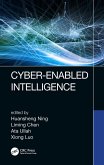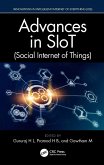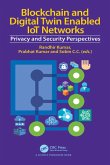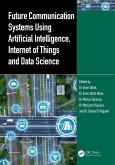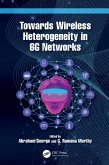Cyber-Enabled Intelligence (eBook, PDF)
Redaktion: Ning, Huansheng; Luo, Xiong; Ullah, Ata; Chen, Liming
46,95 €
46,95 €
inkl. MwSt.
Sofort per Download lieferbar

23 °P sammeln
46,95 €
Als Download kaufen

46,95 €
inkl. MwSt.
Sofort per Download lieferbar

23 °P sammeln
Jetzt verschenken
Alle Infos zum eBook verschenken
46,95 €
inkl. MwSt.
Sofort per Download lieferbar
Alle Infos zum eBook verschenken

23 °P sammeln
Cyber-Enabled Intelligence (eBook, PDF)
Redaktion: Ning, Huansheng; Luo, Xiong; Ullah, Ata; Chen, Liming
- Format: PDF
- Merkliste
- Auf die Merkliste
- Bewerten Bewerten
- Teilen
- Produkt teilen
- Produkterinnerung
- Produkterinnerung

Bitte loggen Sie sich zunächst in Ihr Kundenkonto ein oder registrieren Sie sich bei
bücher.de, um das eBook-Abo tolino select nutzen zu können.
Hier können Sie sich einloggen
Hier können Sie sich einloggen
Sie sind bereits eingeloggt. Klicken Sie auf 2. tolino select Abo, um fortzufahren.

Bitte loggen Sie sich zunächst in Ihr Kundenkonto ein oder registrieren Sie sich bei bücher.de, um das eBook-Abo tolino select nutzen zu können.
The book provides an advanced vision and trends of computational intelligence in cyberspace and cyber-enabled spaces. It reviews architectures and models, as well as state-of-the-art computational and interpretation capabilities for social, industrial, and multimedia applications.
- Geräte: PC
- mit Kopierschutz
- eBook Hilfe
Andere Kunden interessierten sich auch für
![Cyber-Enabled Intelligence (eBook, ePUB) Cyber-Enabled Intelligence (eBook, ePUB)]() Cyber-Enabled Intelligence (eBook, ePUB)46,95 €
Cyber-Enabled Intelligence (eBook, ePUB)46,95 €![Advances in SIoT (Social Internet of Things) (eBook, PDF) Advances in SIoT (Social Internet of Things) (eBook, PDF)]() Advances in SIoT (Social Internet of Things) (eBook, PDF)58,95 €
Advances in SIoT (Social Internet of Things) (eBook, PDF)58,95 €![Blockchain and Digital Twin Enabled IoT Networks (eBook, PDF) Blockchain and Digital Twin Enabled IoT Networks (eBook, PDF)]() Blockchain and Digital Twin Enabled IoT Networks (eBook, PDF)53,95 €
Blockchain and Digital Twin Enabled IoT Networks (eBook, PDF)53,95 €![Future Communication Systems Using Artificial Intelligence, Internet of Things and Data Science (eBook, PDF) Future Communication Systems Using Artificial Intelligence, Internet of Things and Data Science (eBook, PDF)]() Future Communication Systems Using Artificial Intelligence, Internet of Things and Data Science (eBook, PDF)53,95 €
Future Communication Systems Using Artificial Intelligence, Internet of Things and Data Science (eBook, PDF)53,95 €![Principles of Verilog Digital Design (eBook, PDF) Principles of Verilog Digital Design (eBook, PDF)]() Wen-Long ChinPrinciples of Verilog Digital Design (eBook, PDF)58,95 €
Wen-Long ChinPrinciples of Verilog Digital Design (eBook, PDF)58,95 €![Wireless and Mobile Networking (eBook, PDF) Wireless and Mobile Networking (eBook, PDF)]() Mahbub HassanWireless and Mobile Networking (eBook, PDF)49,95 €
Mahbub HassanWireless and Mobile Networking (eBook, PDF)49,95 €![Towards Wireless Heterogeneity in 6G Networks (eBook, PDF) Towards Wireless Heterogeneity in 6G Networks (eBook, PDF)]() Towards Wireless Heterogeneity in 6G Networks (eBook, PDF)53,95 €
Towards Wireless Heterogeneity in 6G Networks (eBook, PDF)53,95 €-
-
-
The book provides an advanced vision and trends of computational intelligence in cyberspace and cyber-enabled spaces. It reviews architectures and models, as well as state-of-the-art computational and interpretation capabilities for social, industrial, and multimedia applications.
Hinweis: Dieser Artikel kann nur an eine deutsche Lieferadresse ausgeliefert werden.
Dieser Download kann aus rechtlichen Gründen nur mit Rechnungsadresse in A, B, BG, CY, CZ, D, DK, EW, E, FIN, F, GR, HR, H, IRL, I, LT, L, LR, M, NL, PL, P, R, S, SLO, SK ausgeliefert werden.
Hinweis: Dieser Artikel kann nur an eine deutsche Lieferadresse ausgeliefert werden.
Produktdetails
- Produktdetails
- Verlag: Taylor & Francis eBooks
- Seitenzahl: 353
- Erscheinungstermin: 8. August 2019
- Englisch
- ISBN-13: 9780429591679
- Artikelnr.: 57534045
- Verlag: Taylor & Francis eBooks
- Seitenzahl: 353
- Erscheinungstermin: 8. August 2019
- Englisch
- ISBN-13: 9780429591679
- Artikelnr.: 57534045
- Herstellerkennzeichnung Die Herstellerinformationen sind derzeit nicht verfügbar.
Huansheng Ning, PhD, earned his PhD from Beihang University in 2001. Currently, he is a professor and vice dean of the School of Computer and Communication Engineering, University of Science and Technology, Beijing, China. His current research focuses on Internet of Things, cyber philosophy, science and technology. Dr. Ning is the founder of Cyberspace and Cybermatics International Science and Technology Cooperation Base, and co-founder and vice chair of Beijing Engineering Research Center for Cyberspace Data Analysis and Applications. He serves as a steering committee member of IEEE Internet of Things Journal and associate editor of IEEE System Journal. He is co-chair of IEEE Transactions on Cybermatics. He hosted the 2013 World Cybermatics Congress and the 2015 Smart World Congress as the joint executive chair. Dr. Ning received the IEEE Computer Society Meritorious Service Award in 2013, and IEEE Computer Society Golden Core Award in 2014. He is an IET fellow and IEEE senior member. Liming Chen, PhD, is professor of Computer Science in the School of Computer Science and Informatics at De Montfort University, Leicester, UK. He earned his BEng and MEng from Beijing Institute of Technology (BIT), China, and his PhD in Artificial Intelligence from De Montfort University, UK. His current research interests include data analytics, pervasive computing, artificial intelligence, and user-centered intelligent systems and their applications in smart healthcare. He is well published with more than 190 books, book chapters, journals/transactions, and conference and workshop articles in the above areas. Dr. Chen is an IET fellow, an IEEE senior member, a co-founder and co-director of the UK-China Gait and Health Innovation Institute at the DMU-USTB (University of Science and Technology Beijing, China) Joint Research Lab on Smart Healthcare and the IEEE CIS "User-centred Smart Systems" Task Force. Ata Ullah, PhD, earned his BS and MS in Computer Science from COMSATS University, Islamabad, Pakistan, in 2005 and 2007, respectively, and PhD in Computer Science from IIUI, Pakistan, in 2016. From 2007 to 2008, he was a software engineer at Streaming Networks, Islamabad. Dr. Ullah contributed to the National University of Modern Languages (NUML), Islamabad, Pakistan as lecturer/head project committee from 2008 to 2015 and as assistant professor from 2015 to 2017 in the Department of Computer Science. From 2017 to 2018, he worked as a research fellow at the School of Computer and Communication Engineering, University of Science and Technology, Beijing, China. Dr. Ullah rejoined NUML in September 2018. He has supervised 112 projects. He has authored several papers in impact factor journals and contributed to books as well. He is also a reviewer and guest editor. His areas of interest are WSN, IoT, cyber physical social thinking (CPST) space, cyber-intelligence, and health services. Xiong Luo, PhD, earned his PhD from Central South University, China, in 2004. From 2004 to 2005, he received postdoctoral fellowships from Tsinghua University, China. From 2012 to 2013, he was a visiting scholar at Arizona State University, USA. He currently works as a full professor in the School of Computer and Communication Engineering, University of Science and Technology, Beijing, China. His current research interests include machine learning, cloud computing, and cyber-physical systems. He has published extensively in his areas of interest in journals such as IEEE Transactions on Industrial Informatics, IEEE Transactions on Human-Machine Systems, IEEE Transactions on Network Science and Engineering, IEEE Internet of Things Journal, and Future Generation Computer Systems. Prof. Luo is a senior member of IEEE. He was a recipient of the 2002 IEEE CSS/Beijing Chapter Young Author Best Paper Award.
1. Introduction. 2. Cyber-Enabled Intelligence Architectures and
applications. 3. Enabling Technologies and Research Domains. 4. Cyber
Intelligence and Machine Learning Techniques. 5. Advancements of Social
Intelligence with Cyber Intelligence. 6. Security and Privacy in
Cyber-Enabled intelligent/smart Applications. 7. Supporting Technologies
and Research Area for Cyber-Enabled Intelligence.
applications. 3. Enabling Technologies and Research Domains. 4. Cyber
Intelligence and Machine Learning Techniques. 5. Advancements of Social
Intelligence with Cyber Intelligence. 6. Security and Privacy in
Cyber-Enabled intelligent/smart Applications. 7. Supporting Technologies
and Research Area for Cyber-Enabled Intelligence.
1. Introduction. 2. Cyber-Enabled Intelligence Architectures and
applications. 3. Enabling Technologies and Research Domains. 4. Cyber
Intelligence and Machine Learning Techniques. 5. Advancements of Social
Intelligence with Cyber Intelligence. 6. Security and Privacy in
Cyber-Enabled intelligent/smart Applications. 7. Supporting Technologies
and Research Area for Cyber-Enabled Intelligence.
applications. 3. Enabling Technologies and Research Domains. 4. Cyber
Intelligence and Machine Learning Techniques. 5. Advancements of Social
Intelligence with Cyber Intelligence. 6. Security and Privacy in
Cyber-Enabled intelligent/smart Applications. 7. Supporting Technologies
and Research Area for Cyber-Enabled Intelligence.

